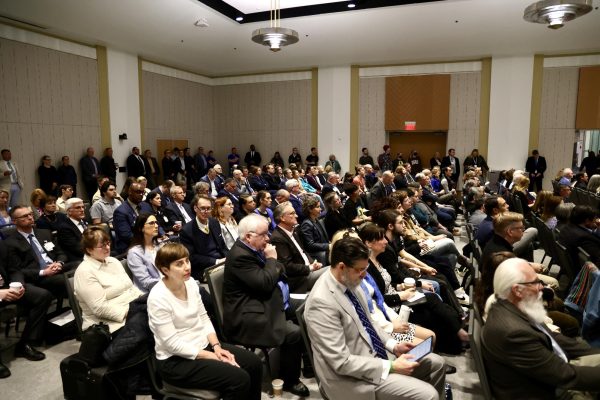SG may adopt more flexible voting rules
March 4, 2008
Students could be given more freedom in the way they vote for Student Government senators-at-large if the Senate approves an amendment to the constitution.
The Internal Affairs Committee reviewed the amendment at a meeting yesterday afternoon, which proposed senators-at-large would be elected by a cumulative voting method that would give students 15 votes to freely allocate among the candidates.
Currently students can vote for 15 candidates and can only vote for each candidate once. Cumulative voting would allow students to vote 15 times in any way they chose.
For example, a student could give all 15 votes to one candidate or give five votes to three candidates, said Tom Rauf, chairman of the committee and sponsor of the legislation.
The committee unanimously voted the amendment to the full Senate, which meets tomorrow night. Since it is a constitutional amendment, it must pass the full Senate twice.
Cumulative voting would serve to give representatives from small organizations on campus a better chance of being elected to the Senate, Rauf said.
“Cumulative voting is used in the corporate world mostly, and the idea is for minority shareholders to have a say in what’s going on,†Rauf said.
This amendment would not go into effect for the upcoming SG spring elections.
Senators are usually nominated on the ticket of a presidential candidate, but a cumulative voting system could change that and allow candidates to run without being aligned with a specific candidate, said Sen. Noah Meeks. The system could bring in different ideas and a group of senators that would hold the SG president accountable, he said.
“I think it would bring more intellectual diversity (to the Senate),†Meeks said. “And the president would have to work harder.â€
Senate accountability was the subject of another amendment discussed by the committee yesterday. The legislation would require the Senate to write an act every year outlining the behavioral and job expectations of the senators during their time in office.
The amendment, which was also unanimously recommended to the full Senate, would serve as a contract with very specific guidelines that senators would sign, said Tyler Montell, senate President and lone presidential candidate for the spring.
“We’re not mandating people’s behavior but we are saying this is what we expect of you and what the student body expects of you,†Montell said. “We’re getting away from the adage that senators don’t really do anything.â€
The act would be valid the entire year the senators are in office and would expire on the first meeting of the newly elected Senate, when new senators would pass its own act by the second full meeting of the fall semester. The Committee on Committees would handle violations of the act and the Impeachment and Censure Committee would have the authority to remove senators for failing to adhere to the guidelines.
This act is not in response to poor participation from senators, Montell said, but is instead a way of keeping SG members accountable and a way of being more specific about the expectations of the job.
“This is not because we think senators don’t do anything,†he said. “This is a way of making the things we do more visible, and saying we understand we’re held to a higher standard, and we’re going to go a step beyond that.â€























































































































































